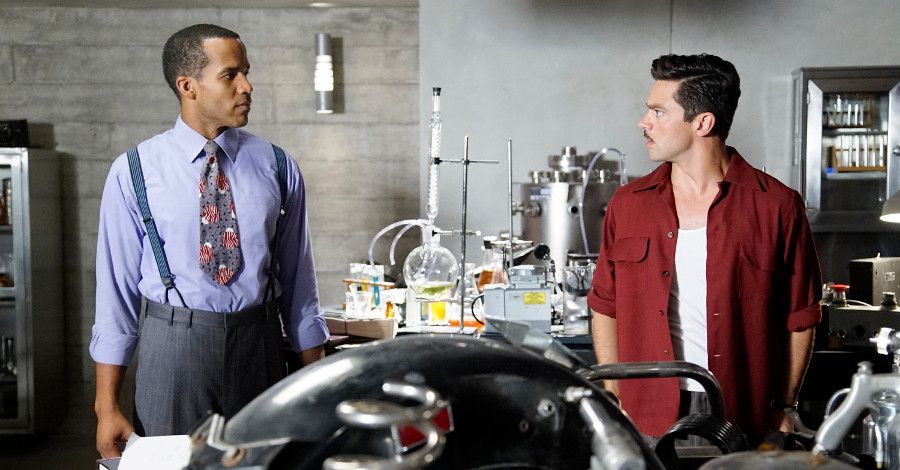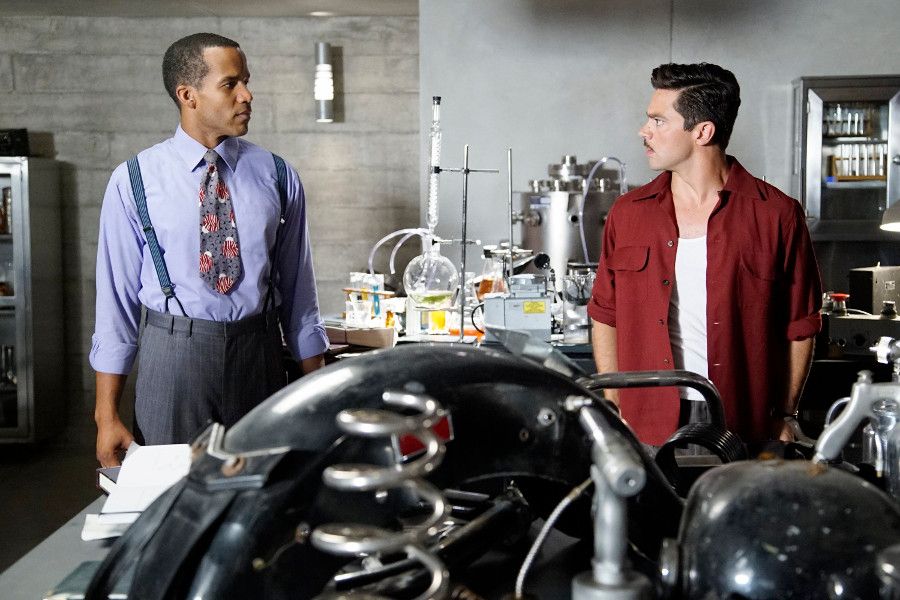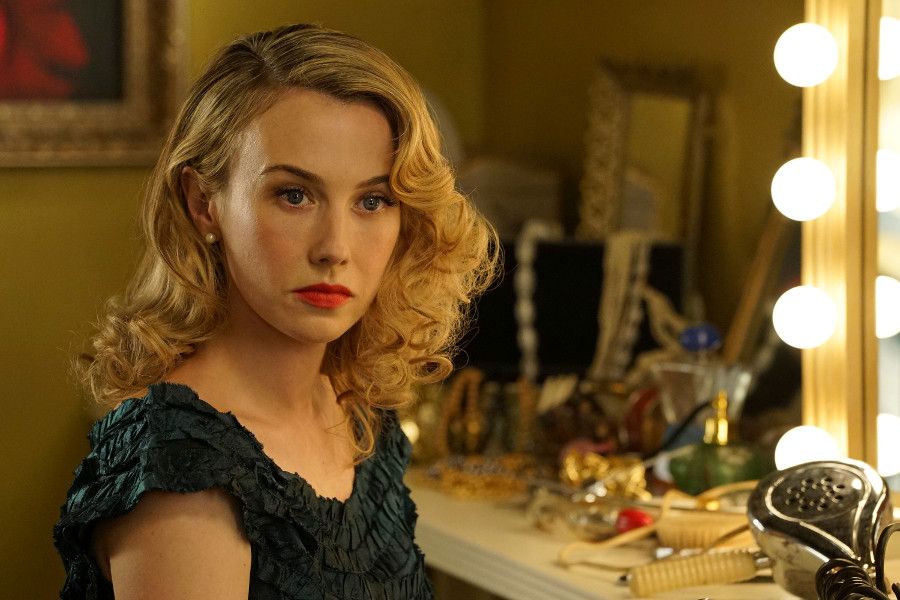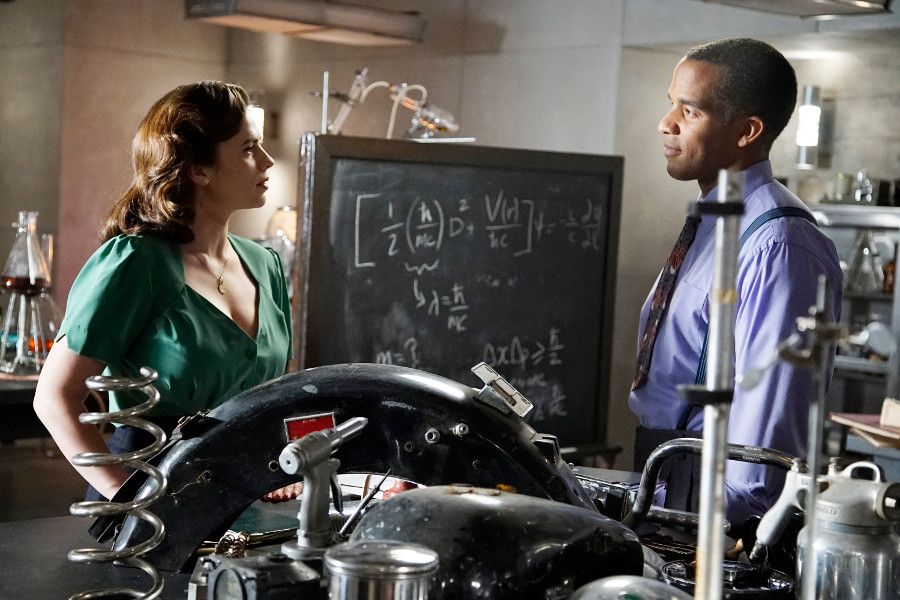Part of the reason why Marvel's "Agent Carter" TV series has remained such a fan favorite is not only that the makeup of comic book fandom has (thankfully) diversified by leaps and bounds in recent years but also that the show spoke directly to new fandom's struggle to be acknowledged by a dude-heavy community. Through its first season, the show found layers upon layers in its story of equality, often backed up by some solid period action. But when Season 1 wrapped, Peggy Carter had seemingly won the respect of her male coworkers and turned the page in her spying career. With that accomplishment in the rearview, the big question hanging over the show's second year was how exactly it would keep up its rep as the show for a new generation of fans without feeling like it was retreading the same ground.
Tonight's Season 2 episode, "Better Angels," answers that question with an hour that inches the season's super story forward. Rather than presenting a hyper-focused procedural story or a some other one-off adventure, the episode picks up the multiple threads started in last week's two-part premier and gives them definition with equal parts character work, fan-servicing humor and a few tricky twists.
The hour begins with an investigation into the death (and life) of Dr. Wilkes - the Los Angeles scientist who went from SSR ally to Peggy's latest love interest quickly before seemingly being blown apart in a fight for the mysterious Zero Matter. As Agent Carter grapples with the guilt she feels for sending Wilkes into the lab that ultimately became his tomb, the clues in his house point almost too conveniently to his involvement in a Soviet spy ring. While the papers run with the salacious headline, Peg and Chief Sousa know that the who thing stinks of a setup -one likely implemented by actress Whitney Frost and her power-hungry husband Calvin Chadwick. The heroes set out to exonerate their new friend with the help of who else but Howard Stark.
And thank all the cosmic gods of the Marvel Universe for Dominic Cooper. The perpetual guest-star for every MCU project set before 1970, Cooper's take on Tony Stark's dad is the embodiment of the Studios' mix of fast-paced genre entertainment and scenery chewing comedy chops. Working not only as the head of his own film studio but also its key director and chief technologist, Howard has spent his time in LA looking to score new advances in the art of filmmaking and to score with the bevy of starstruck would-be actresses on hand in the City of Angels. After pausing his work on a film version of post-War Timely comic star Kid Colt's Western adventures, Stark quickly recognizes that the mysterious lapel pins that are Peggy's only clue belong to the Arena Club - your standard old white men smoking cigars while pulling the levers of power affair. Like another quick-witted media mogul, Howard would never belong to a club that would have him as a member. But in order to get Peg and inside track on the organization that's tied to Wilkes' murder, he makes an exception.
The scene where Howard and Jarvis break up their dull tour of the Arena Club's headquarters with a smoke screen of bathing beauties in tow is a fun flight of fancy. In pure narrative terms, the sequence does little to push the story forward. Peggy's planned audio bugs short out. Her discovery of the Arena's secret inner chamber gives little guidance to the overall mystery. And even the one clue she finds -competing newspaper headlines for the next day meant to shame Chadwick's chief Senatorial opponent out of the race - collapses when its existence fails to secure any kind of tangible proof of the conspiracy against Wilkes. But still, the storyline serves as more than a bump in the road to toughen our hero's resolve. The Arena Club and its all-white, all-male, old money trappings is a significant piece of this season's metaphorical backbone. While last year Peggy was taking on sexism on her own turf, her fight now expands out to the broader world and all the bigotry and comes with it.
But before those ideas can get another turn on the screen, there are some of the season's juicier subplots to cover. For one, the sudden return of East Coast Chief and eternally untrustworthy SSR agent Jack Thompson to the team's midst carries its own intrigue. While part of Jack's role in the story is to play the hard-nosed boss who stomps on Peggy's theories and investigations at every turn (you could almost see him saying, "Hand over your badge and gun!"), his secret reasoning injects some interesting questions into the proceedings. On the surface, Thompson's willingness to kill a true investigation into Zero Matter is all about him impressing his dad's old pal at the FBI. It sets up a simple conflict over whether our boy will go against his own moral code in order to get ahead - the kind of story that always turns out with a last minute face turn in the final episode. But as Thompson watches the film footage of the atomic experiment that created Zero Matter, his eyes flash at the raw energy and wonder created by this killer field test. It's not simply a career Jack is after. He's drawn to power. And that kind of internal conflict always makes stories more interesting -and sometimes more tragic.
Speaking of which, Whitney Frost's continued development this week doesn't flip over any tables, but our season's key villain definitely finds room to impress. Hiding the Zero Matter crack in her flawless facade, Frost's problem isn't just one of vanity but of pure terror. As Peggy and company learn this week, their foe is more than a pretty face but also a pretty damn good scientist. We see the brains behind the operation working as Frost tricks Chadwick into taking Carter seriously after a tense but close-to-the-vest conversation between the two women. But her mind can't comprehend what she's become when the Zero Matter infection literally eats away at a sleazy Hollywood agent looking to take advantage. In many ways, this villain is every bit the mirror to Peggy as Dottie was last season. She's willing to do whatever she can to make it through in a man's world. But Frost's goals are much darker and dangerous for her and everyone around her.
Still, if there's a place where this week's assemblage of subplots comes together, it's in the hunt for justice for Wilkes. And luckily for fans worried that "Agent Carter" killed off its first major black character before he even left an imprint on the show...the good doctor lives! With shades of Ralph Ellison, Wilkes has become a literal invisible man thanks to the Zero Matter explosion. After Howard Stark discovers an anti-gravitational field left in his wake, the team works to "develop" Wilkes' non-corporeal essence like a floating film negative. The idea is the goofiest kind of comic book science, but the metaphor works as strongly as any in the show's history. Our doctor entered the show as a genius trapped in the cruel fate of his circumstances as a black man in mid-20th Century America, and now he's trapped outside the bounds of reality as well - unable to be seen, speak for himself or to touch the woman who has shown him a kindness far outside the boundaries of the society they live in.
The rest of the episode is a quick succession of plot points and Easter Eggs. After Peggy is attacked by an assailant presumably sent by Chadwick, Stark beefs up his mansion security with a warning system that might as well be labeled "Jarvis 1.0" for what we know will become of his son's technology. But then Howard quickly shuffles off to Peru to search for an answer to Dr. Wilkes' predicament (special guest stars don't come cheap) while the rest of the team decides to take the fight back to Frost, Chadwick and the Arena Club with renewed urgency.
But the real lesson of this week blossoms out of that moment shared between Peggy and Wilkes. Sure, many viewers will be caught up in the romantic angle as she insists that he stay and he acquiesces in the most melodramatic way possible. But the point here is that Peggy has found her new mission on screen: she's here to be the fighter for all the marginalized voices in this fictional superheroic landscape. And she can never declare her mission complete until everyone has as much freedom and power as she's earned. Considering how real history turned out, that could mean many, many seasons of the show to come.




